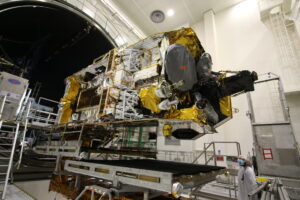Op-ed | Exporting is the final frontier for UK space and other high-tech industries
By Jason Rainbow

The good news is that the industries in which the UK excels are ready to strike new partnerships, forge new alliances, and create new opportunities. For a prosperous future, it is time for the country to dramatically scale up its high-tech exports.
The UK enjoyed a vibrant heavy manufacturing sector for a hundred years or more before its relative decline. Today, we play host to a wave of high-tech manufacturing, design and service industries that lead the world in many sectors. Consider, for example, that the majority of the world’s motorsport industry is located in a small ring around Silverstone in the Midlands. According to the Motorsport Industry Association, this cutting-edge industry alone is worth £9 billion ($12.5 billion) per year to the UK economy.
Likewise, in the space industry. NASA may take the headlines, but the UK’s stable of design, technology and manufacturing space industries are world leading in many cases. My own company, Inmarsat, has been designing and operating satellites for more than 40 years for example. Founded by the international community to save lives at sea, we now bring world-class mobile connectivity to even the most remote parts of the world, on land, on the waves and in the air.
For cutting-edge sectors like these to thrive and for the economy to rebuild through them, we need two things as the country looks to the future.
The first is a skilled workforce. Teachers are already warning of the impact of a year of online schooling on the prospects for today’s students. This adds to the challenge we already had to encourage more people into Science, Technology, Engineering and Maths (STEM) subjects and careers. Therefore, this needs to be a priority in government plans to support education over the years ahead if we are to meet industry objectives to attract top talent and deliver the growth the country needs.
The second is creating the right conditions to export. Industry has proven adept at forging the links and relationships to do this, but government still needs to give a helping hand.
In the defence industry, we have the Five Eyes intelligence partnership. Beyond the obvious benefits of knowledge sharing between five close allies, it provides a stable footing and natural connections for UK defence companies overseas.
And in the space industry we now have a space bridge, thanks to a new partnership signed between the UK and Australia only last month. Focused on mutual knowledge sharing and investment, it opens up opportunities in satellite communications, space science, Earth observation, climate monitoring, satellite navigation, launch and space-enabled applications.
These types of schemes are key to successfully exporting our knowledge and high-tech industries. The good news is that they are already working.
Inmarsat recently announced a new, long-term contract extension to the partnership with the Australian Defence Force to provide satellite connectivity worldwide. By the end of the agreement, Australian soldiers, pilots and naval crews will have enjoyed fast, high quality, secure broadband and data services wherever they operate, for more than 40 years from a British-based company.
Thanks to this kind of high-tech industry, sailors out at sea for months on end have a way to communicate with their families back home. And soldiers out in the field have a way to coordinate rescue services and other operations more quickly and securely.
It used to be said that the UK was a nation of shopkeepers. Today, we have the opportunity to become a nation of twenty-first century engineers and innovators. The key to success will be building the equivalent of space bridges in other industries where the UK excels so that it can sell significantly more of our very best goods and services to the world.
Rajeev Suri is CEO of British satellite operator Inmarsat, which operates a fleet of communications spacecraft in L-band, Ka-band and S-band. Suri, who was previously the CEO of Finnish telecoms infrastructure company Nokia, succeeded Rupert Pearce at Inmarsat March 1.
April 6, 2021 at 12:30PM
via SpaceNews read more...

Post a Comment